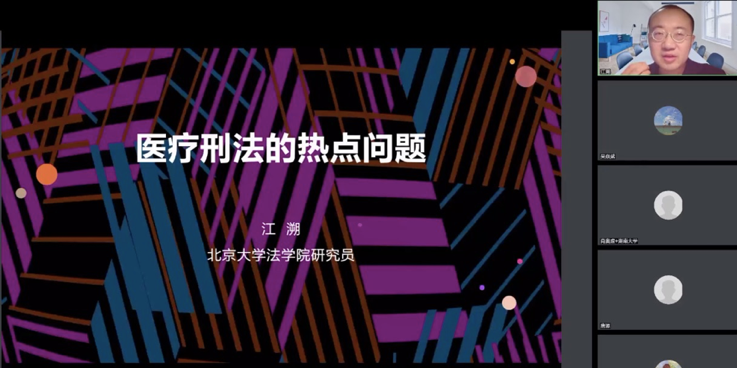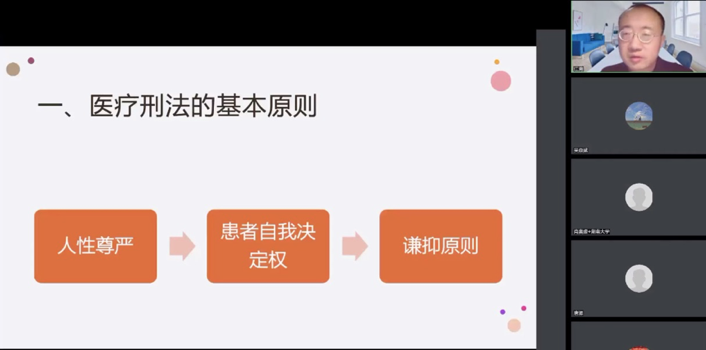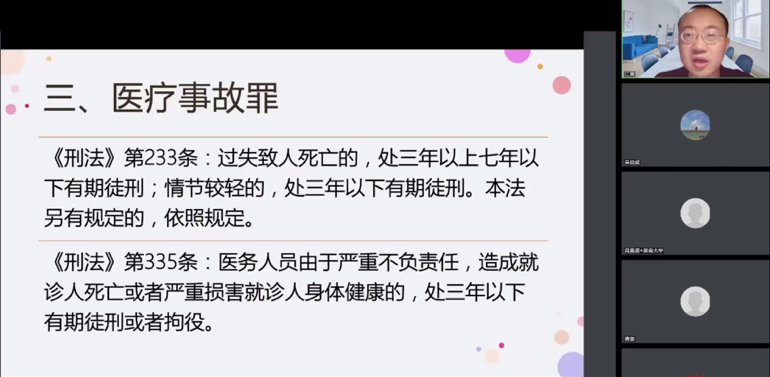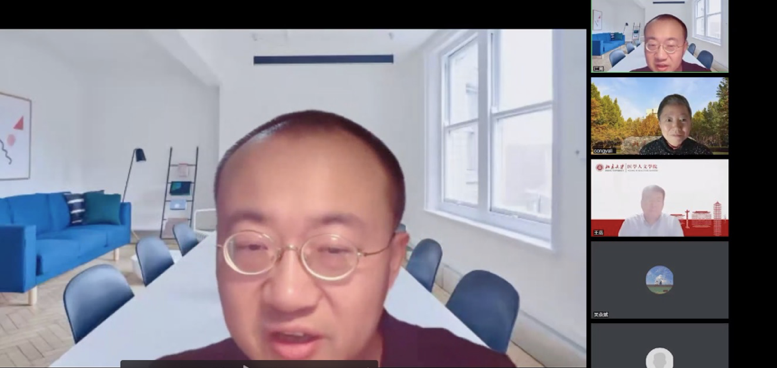The 105th Peking University Medical Humanities Forum: Hot Issues in Medical Criminal Law From Jiang Su
On the evening of November 28, 2022, Professor Jiang Su, a researcher and doctoral supervisor of Peking University Law School, was invited to give a special lecture entitled "Hot Issues in Medical Criminal Law".
This lecture was hosted by Wang Yue, professor of the School of Health Humanities of Peking University. The lecture was conducted online through Tencent conference, and more than 100 teachers and students participated in the lecture and held a heated discussion.
Three basic principles of medical criminal law
In the opening introduction, Mr. Jiang emphasized that the basic principles of medical criminal law include human dignity, the patient's right to self-determination and restraining criminal law. First of all, the principle of human dignity and the patient's right to self-determination tell us that the patient is not a simple object of medical activities, but always a subject. In addition, restraining criminal law is a very important principle which makes medical criminal law a certain distance from our life. The principle of restraining criminal law means that the application of criminal law needs to be modest and low-key. It is a last resort in legal tools. That is to say, for medical activities, our attitude in criminal justice practice is to try not to use the method of criminal law norms to punish the illegal acts of doctors.

Three basic principles of medical criminal law
In the opening introduction, Mr. Jiang emphasized that the basic principles of medical criminal law include human dignity, the patient's right to self-determination and restraining criminal law. First of all, the principle of human dignity and the patient's right to self-determination tell us that the patient is not a simple object of medical activities, but always a subject. In addition, restraining criminal law is a very important principle which makes medical criminal law a certain distance from our life. The principle of restraining criminal law means that the application of criminal law needs to be modest and low-key. It is a last resort in legal tools. That is to say, for medical activities, our attitude in criminal justice practice is to try not to use the method of criminal law norms to punish the illegal acts of doctors.
If we use case retrieval to investigate the criminal charges involving medical activities, such as the crime of medical accident, the crime of illegal medical practice and the crime of illegal birth control operation. When dealing with some of the most typical or core medical criminal crimes, we will find that the number of cases is extremely rare. This is not because there are not too many medical related criminal cases in practice, but because our judicial organs have kept the utmost restraint in treating medical activities and doctors, and try not to use criminal law to punish them. So it can be said that the restraining criminal law has been implemented in our practice of medical criminal law.

Classification of medical criminal charges and analysis of their constituent elements
In the lecture, Mr. Jiang gave us a brief introduction to some major charges of medical criminal law. He divided these charges into three categories. The first category is the crime of violating citizens' personal rights. Teacher Jiang reminded that in the criminal law of medical treatment, related medical crimes may be related to crimes of violating personal rights in the criminal law, such as intentional homicide, intentional injury and other crimes. The second category is crimes that undermine the order of the market economy. Here, it mainly involves drug crimes and crimes that undermine the order of drug management. For example, the crime of producing and selling fake drugs and substandard drugs stipulated in our criminal law. Such crimes are defined in our criminal law as crimes against the order of the market economy. The third category is crimes endangering public health. For example, the crime of medical malpractice, the crime of illegal medical practice, the crime of illegal birth control operation, the crime of interfering with the prevention and treatment of infectious diseases, etc. These crimes are stipulated in the crime of endangering public health.
In the follow-up lecture, Mr. Jiang, centering on the two most common crimes in the medical field, the crime of medical malpractice and the crime of illegal medical practice, combined with specific laws and typical judicial cases, disassembled and analyzed the constituent elements of the crime, and explained the crime of medical malpractice and the crime of illegal medical practice from the theoretical and judicial practice levels. In the process of explanation, the principle of restraining criminal law mentioned in the opening part was integrated to make the audience better understand the principle and purpose of medical criminal law.

Intersection in medical criminal law
In the second half of the lecture, Mr. Jiang carried out theoretical analysis around the topics of patients' informed consent, euthanasia/dignified death, organ transplantation, gene editing and cloning, illegal birth control surgery and the debate on the legalization of surrogacy, helping the audience understand the principles of human dignity and the patient's right to self-determination in the medical criminal law. Teacher Jiang reminded that these issues are interdisciplinary issues, which require us to think urgently, and at the same time, these issues require us to carry out dialogue between different disciplines. These new fields require us to think more coherently and solve the resulting problems more systematically, so as to maintain the balance between technological innovation, human rights protection and human dignity.

Finally, Mr. Jiang concluded that through the study of medical criminal law, we can experience the understanding of life, the understanding of individual rights before the power of experts such as doctors, and the philosophical thinking between government control and individual freedom.


